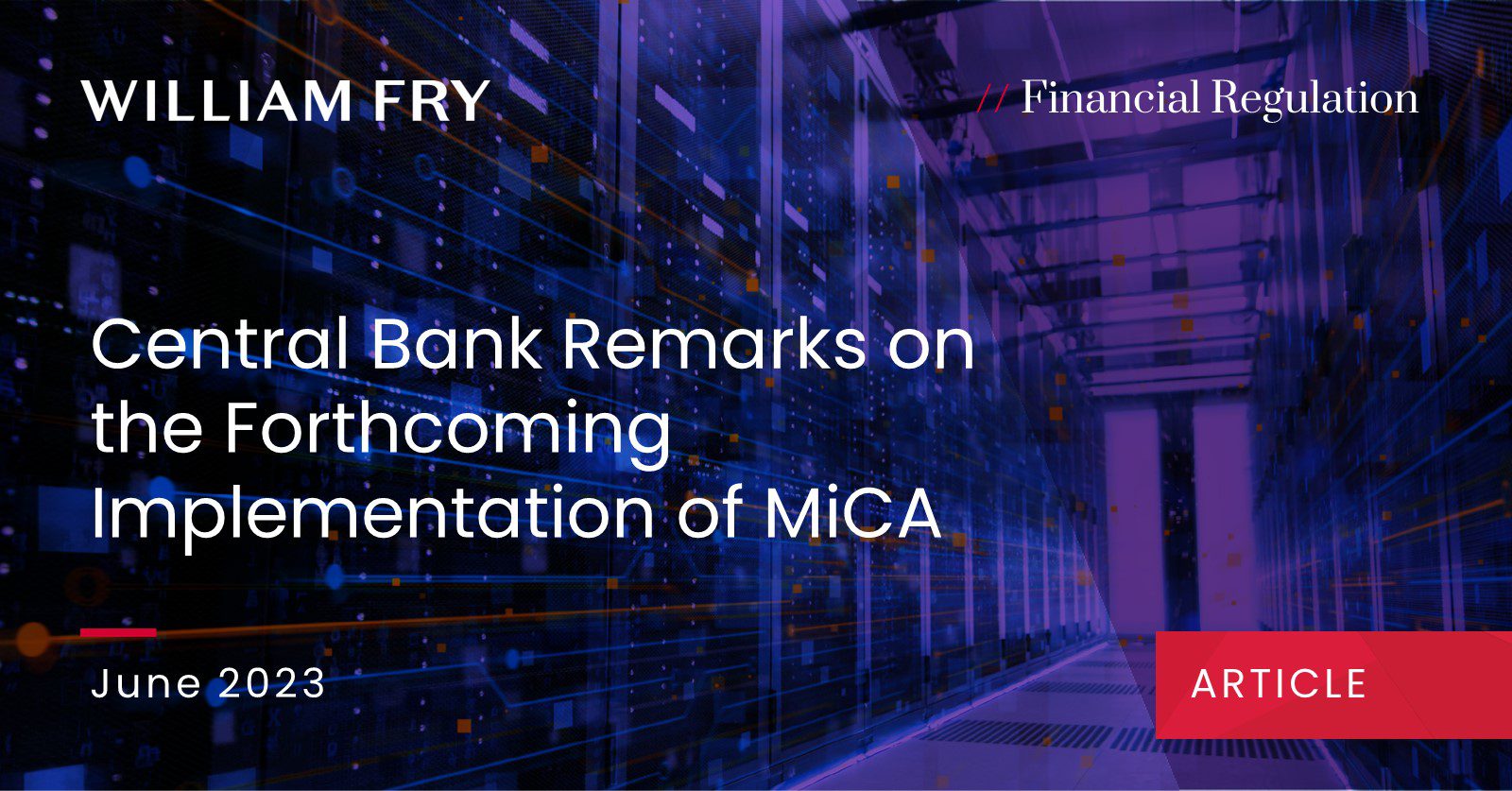On 30 May 2023, at a Blockchain Ireland event, Gerry Cross, Director of Financial Regulation, Policy & Risk (Director) in the Central Bank of Ireland (Central Bank), spoke about the Markets in Crypto-Assets Regulation (MiCA), its implementation from next year, and other related topics.
The purpose of MiCA is to implement and harmonise an EU-wide regulatory framework for crypto-assets (and crypto asset service providers (CASPs)). The Central Bank Director explained that the Central Bank and the Department of Finance in Ireland were closely involved in the EU legislative process to finalise MiCA.
Implementation Timeframe
The Director commented that MiCA is expected to apply to issuers of stablecoins (Asset Referenced Tokens (ARTs) and E-Money Tokens (EMTs)) around July 2024 and to CASPs at the beginning of 2025. MiCA also provides for a potential transition phase of up to 18 months for CASPs already operating under applicable law in the relevant jurisdiction.
Please see our briefing on MiCA here for further information on the new regulatory framework.
Supervisory Challenges
The Director noted that it would be a challenge for supervisors in relation to the implementation of MiCA and ensuring that stablecoins “live up to their name” in terms of maintaining a stable value.
In relation to CASPs, the Director remarked that MiCA would impose important consumer protection measures on CASPs, such as consumer warnings, minimum capital requirements, governance and transparency requirements. Prohibitions on insider dealings and market manipulations will also be provided for.
The Director noted the climate impact on crypto and the scale of energy use in crypto models is an important area of attention going forward and that MiCA includes important disclosure requirements in this respect.
The Director also referred to the degree of complexity, opacity and the potential for conflicts of interest that can arise in the context of large groups focused on crypto markets. This group complexity point was recently highlighted in the International Organization of Securities Commissions (IOSCO) consultation paper dated 23 May 2023.
In terms of implementing MiCA, the Director remarked that the Central Bank is particularly concerned with ensuring that there is the necessary coordination and consistency across Europe with the usual questions (around the degree of rigour and emphasis with which the different provisions are applied) yet to be resolved. The Director, therefore, suggested that there would be merit in the European Banking Authority (EBA) establishing a supervisory coordination mechanism to drive consistency for crypto-related applications during the current period leading up to MiCA implementation (similar to the supervisory network the European Securities and Markets Authority (ESMA) established during Brexit-related migrations).
Current regulatory regime applicable to crypto firms in Ireland
The Central Bank has seen considerable activity in Ireland from firms preparing for the formal authorisation process under MiCA. Examples include preparation by Electronic Money Institutions (EMIs) and Virtual Asset Service Providers (VASPs).
The number of EMI firms in Ireland currently stands at 21. Since 2022, when the Central Bank registered the first VASP in Ireland, a further five VASPS have been registered.
VASPs are supervised by the Central Bank for AML/CFT purposes only. Please see our article here for more details on the Central Bank’s Anti-Money Laundering Bulletin published in July last year, which set out issues identified by the Central Bank in its assessment of registration applications and provided information on its expectations in these areas.
How can William Fry assist you?
William Fry is a market leader in the regulated FinTech sector. Our Financial Regulation team has extensive experience securing authorisation of Payment Institutions, Electronic Money Institutions and other regulated FinTechs. For example, William Fry has acted for one-third of the Electronic Money Institutions that have been granted authorisation in Ireland to date on their applications for authorisation as an Electronic Money Institution. Please see our briefing here for further information on Electronic Money Institution authorisations in Ireland.
Contributed by Jane Balfe



